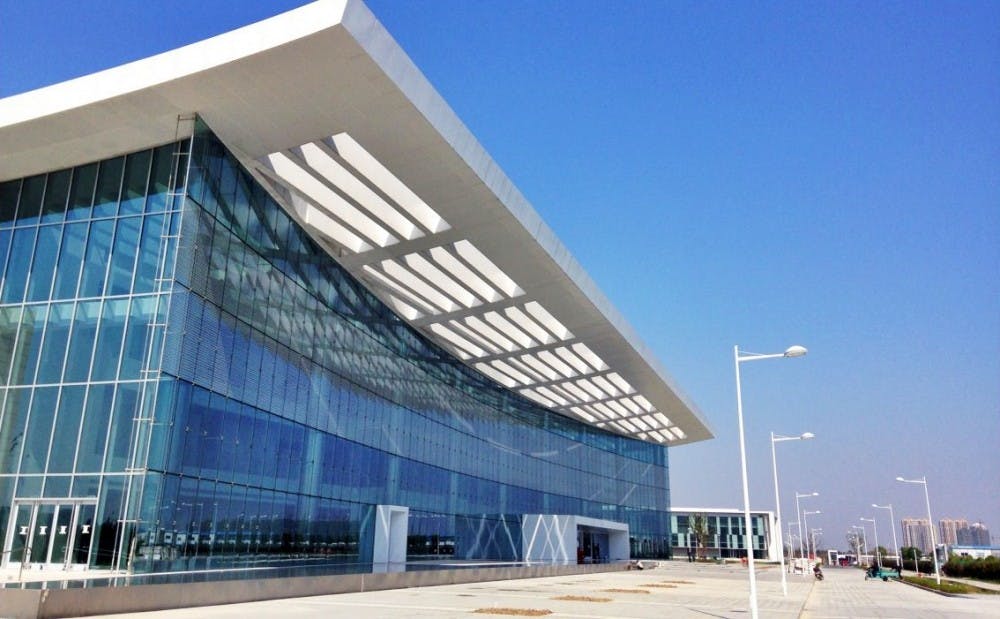The Duke Kunshan University campus has just more than doubled in size. Phase 2, the long awaited second stage of DKU’s campus construction, officially opened on May 22. Student housing, dining and employee offices are now in operation, a so-called “soft open” ahead of a “hard open” that will take place for the rest of the Phase 2 campus in the fall.
Construction for Phase 2 began in August 2019 and was originally expected to be completed by the end of 2021. The COVID-19 pandemic, labor shortages and extreme weather led to a string of delays in the opening of Phase 2.
Now covering almost 47 acres, Phase 2 of the DKU campus houses a library, sports complex, research center and nine new student residence halls, providing enough housing for upperclassmen and graduate students.
Students with summer housing moved into three of the Phase 2 dorms in May, leaving the off-campus Talent Apartments and the Canadian International School of Kunshan dorms the university had been leasing out for the past three years. Students were also previously housed in the Phase 1 Conference Center and Student Residence Hall.
The sports complex and new soccer field, which promise to increase athletic opportunities for students, will open July 17 and August 13 respectively, according to plans announced by the DKU Office of Operations in a May email. Conceptual plans are already in place for Phase 3 and Phase 4 of campus expansion.

Students react to the new campus
For some students experiencing the “soft opening,” the first glimpses of its new buildings were exciting. DKU senior Nika Tatoshvili said that he was “impressed” by the new dorms and facilities, remarking that the dorms were “so superior, even compared to Phase 1.”
The opening of on-campus student housing has also been “much more convenient” for DKU senior Cammie Li, who used to live off-campus and no longer needs to wait to take the shuttle to walk to parts of campus.
Living in DKU’s Phase 2 dormitories took some adjustments for students used to living in Conference Center or Talent Apartments. DKU senior Yufan Gao, who moved from Talent Apartments said that she was “shocked” when she first arrived.
“This room is much smaller than expected. I think we were spoiled at first, and then we are just coming to this smaller space,” she said.
There have been some bumps along the way. Li noted that the Building E kitchen was still under construction and was missing appliances like a refrigerator during the initial student move-in.
“Moving into a new dorm where no one has lived before, there's little issues here and there with ceiling leaks, AC problems and things like that,” DKU senior Erica Ham said.
Students have also raised concerns about Phase 2 dining, a three-story building that opened July 1 and is run by a completely new vendor, Pandora. Li noted that although students now have more diverse food choices, the price of food has also increased. Other students echoed that Phase 2 food options are more expensive than its Phase 1 counterparts.
Ally Chen, associate director of operations for campus services, wrote in an email to The Chronicle that the cost of Phase 2 food options “varies”, but the set meal and some Chinese options on the third floor of the canteen were consistent with prices in Phase 1 dining and were being provided “without profit” by Pandora.
“We have received positive feedback about the quality and diversity of the new dining service but we recognize there will be opportunities to improve,” Chen wrote.
In the first month of the Phase 2 residence hall opening, regular town halls were held by DKU to hear concerns from students regarding the new dorms. Heads from Residence Life, Housing and the Phase 2 construction team were all regularly in attendance. However, these meetings ceased before the opening of the Phase 2 dining.
Tatoshivili noted that the new communal living situation could potentially create community, while Gao said that it has already given her better opportunities for talking with neighbors and other international students.
Gao, who is also a resident assistant, mentioned that having students all living on campus in the fall will lead to an increase in residence life events for students in the dorms.
“There are a lot of cultural differences that can come about with how people use spaces”, Ham said. “[T]here were a lot of complaints about, when you use the bathroom, do this, or when you use the kitchen, do this, and I totally understand people's frustrations. But I do think we should have more patience with each other.”
Get The Chronicle straight to your inbox
Sign up for our weekly newsletter. Cancel at any time.
“All the issues at least got heard,” Ham added. “Whether they got addressed — I think time will tell.”

